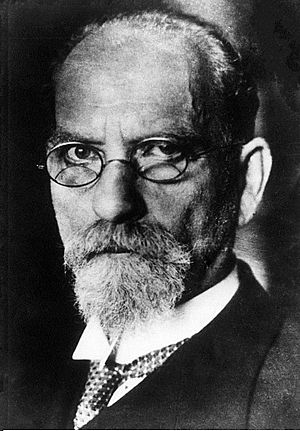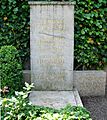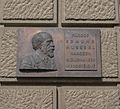Edmund Husserl facts for kids
Quick facts for kids
Edmund Husserl
|
|
|---|---|

Husserl c. 1910s
|
|
| Born | 8 April 1859 Proßnitz, Margraviate of Moravia, Austrian Empire (present-day Prostějov, Czech Republic)
|
| Died | 27 April 1938 (aged 79) |
| Alma mater | University of Vienna (PhD, 1881) University of Halle (Priv.-Doz., 1887) |
| Era | 20th-century philosophy |
| Region | Western Philosophy |
| School | Phenomenology |
Edmund Gustav Albrecht Husserl (born April 8, 1859, died April 26, 1938) was an important Austrian-German philosopher and mathematician. He is known as the person who started a way of thinking called phenomenology.
Husserl believed that our own experience is the main source of all knowledge. He thought that the way we experience things is key to understanding the world.
He studied mathematics and earned his PhD. Later, he studied philosophy with famous teachers like Franz Brentano.
Husserl taught philosophy for many years. He was a professor at the University of Göttingen from 1901. Later, he taught at the University of Freiburg im Breisgau from 1916 until he retired in 1928.
Contents
Who was Edmund Husserl?
His early life and studies
Edmund Husserl was born into a Jewish family in a town that was part of the Austrian Empire. This town is now called Prostějov in the Czech Republic. In 1886, he became a member of the Lutheran Church.
He first focused on mathematics in his studies. But then, he started going to lectures about psychology and philosophy. He was very impressed by his teacher, Franz Brentano. This led Husserl to decide he wanted to spend his life studying philosophy.
What was his first big work?
Husserl's first major book was Philosophie der Arithmetik (1891). In this book, he tried to connect mathematics, psychology, and philosophy. His main goal was to create a strong base for understanding mathematics.
He looked at how our minds understand the idea of number. He thought about how we count objects to get the idea of a number. He also used ideas from his teachers, like the difference between proper and improper ways of seeing things.
For example, if you are standing right in front of a house, you have a proper or direct view of it. But if someone gives you directions to a house, like "the house on the corner of this and that street," that's an improper way of knowing it. You don't see it directly, but you can imagine or understand it through signs.
Another important idea Husserl learned was intentionality. This means that our consciousness (our thoughts and awareness) is always "about" something. It's always directed towards an object or an idea.
What is Phenomenology?
How Husserl developed his main idea
After his book Logical Investigations (1900-1901), Husserl developed his main philosophical idea: phenomenology. He wanted to study how our minds work and how we experience the world.
He believed that to truly understand consciousness, we need to separate our thoughts from the actual objects we are thinking about. He called the real object the "object-in-itself."
To do this, he suggested a special method called epoché (pronounced eh-poh-KAY). This means "bracketing" or setting aside all our usual ideas about the world. It's like putting our beliefs about whether something truly exists on hold. This way, we can focus only on how things appear to our consciousness.
Husserl then focused on the basic, ideal ways our consciousness is structured. He wasn't very interested in the deep metaphysical problem of what reality truly is.
How we see the world
Husserl said that we usually see the world from a "natural standpoint." This means we naturally believe that objects really exist and have properties that come from them. For example, we believe a red ball is truly red and round.
But Husserl proposed a new way of looking at things through phenomenology. He suggested we look at how we, through our different ways of being aware, actually "constitute" objects. This doesn't mean we create the objects physically. Instead, it means we shape how we understand and experience them in our minds.
Later in his life, Husserl also thought about intersubjectivity. This is the idea of how different people can talk about the same object and know they are referring to the same thing. He explored this in his book Cartesian Meditations.
Husserl tried to show how important phenomenology was for scientific study, especially for psychology. He wanted to explain what he meant by "bracketing the natural attitude."
His unfinished work, The Crisis of the European Sciences, talks about these ideas. In it, Husserl looked at the history of Western philosophy and science. He worried that they were becoming too focused only on what can be measured and seen.
Husserl believed that our mental and spiritual experiences have their own reality. This reality is separate from anything physical.
List of works
In German
- 1887. Über den Begriff der Zahl. Psychologische Analysen.
- 1891. Philosophie der Arithmetik. Psychologische und logische Untersuchungen (Philosophy of Arithmetic)
- 1900. Logische Untersuchungen. Erste Teil: Prolegomena zur reinen Logik (Logical Investigations, Vol 1)
- 1901. Logische Untersuchungen. Zweite Teil: Untersuchungen zur Phänomenologie und Theorie der Erkenntnis (Logical Investigations, Vol 2)
- 1911. Philosophie als strenge Wissenschaft (included in Phenomenology and the Crisis of Philosophy: Philosophy as Rigorous Science and Philosophy and the Crisis of European Man)
- 1913. Ideen zu einer reinen Phänomenologie und phänomenologischen Philosophie. Erstes Buch: Allgemeine Einführung in die reine Phänomenologie (Ideas: General Introduction to Pure Phenomenology)
- 1923-24. Erste Philosophie. Zweiter Teil: Theorie der phänomenologischen Reduktion (First Philosophy, Vol 2: Phenomenological Reductions)
- 1925. Erste Philosophie. Erste Teil: Kritische Ideengeschichte (First Philosophy Vol 1: Critical History of Ideas)
- 1928. Vorlesungen zur Phänomenologie des inneren Zeitbewusstseins.
- 1929. Formale und transzendentale Logik. Versuch einer Kritik der logischen Vernunft (Formal and Transcendental Logic)
- 1931. Méditations cartésiennes (Cartesian Meditations)
- 1936. Die Krisis der europäischen Wissenschaften und die transzentale Phänomenologie: Eine Einleitung in die phänomenologische Philosophie (The Crisis of European Sciences and Transcendental Phenomenology: An Introduction to Phenomenological Philosophy)
- 1939. Erfahrung und Urteil. Untersuchungen zur Genealogie der Logik. (Experience and Judgment)
- 1952. Ideen II: Phänomenologische Untersuchungen zur Konstitution.
- 1952. Ideen III: Die Phänomenologie und die Fundamente der Wissenschaften.
In English
- Cartesian Meditations, 1960 [1931]. Cairns, D., trans. Dordrecht: Kluwer. Online.
- The Crisis of European Sciences and Transcendental Philosophy, 1970 [1936/54], Carr, D., trans. Evanston: Northwestern University Press.
- Experience and Judgement, 1973 [1939], Churchill, J. S., and Ameriks, K., translators. London: Routledge.
- Formal and Transcendental Logic, 1969 [1929], Cairns, D., trans. The Hague: Nijhoff.
- Ideas Pertaining to a Pure Phenomenology and to a Phenomenological Philosophy -- First Book: General Introduction to a Pure Phenomenology, 1982 [1913]. Kersten, F., trans. The Hague: Nijhoff.
- Ideas Pertaining to a Pure Phenomenology and to a Phenomenological Philosophy - Second Book: Studies in the Phenomenology of Constitution, 1989. R. Rojcewicz and A. Schuwer, translators. Dordrecht: Kluwer.
- Ideas Pertaining to a Pure Phenomenology and to a Phenomenological Philosophy - Third Book: Phenomenology and the Foundations of the Sciences, 1980, Klein, T. E., and Pohl, W. E., translators. Dordrecht: Kluwer.
- Logical Investigations, 1973 [1913], Findlay, J. N., trans. London: Routledge.
- On the Phenomenology of the Consciousness of Internal Time (1893-1917), 1990 [1928]. Brough, J.B., trans. Dordrecht: Kluwer.
- "Philosophy as Rigorous Science", translated in Lauer, Q., ed., 1965 [1910] Phenomenology and the Crisis of Philosophy. New York: Harper.
- Philosophy of Arithmetic, Willard, Dallas, trans., 2003 [1891]. Dordrecht: Kluwer.
Anthologies:
- Willard, Dallas, trans., 1994. Early Writings in the Philosophy of Logic and Mathematics. Dordrecht: Kluwer.
- Welton, D., ed., 1999. The Essential Husserl. Bloomington: Indiana University Press.
- "Logic and Formal Ontology in the Work of Edmund Husserl." Resource guide on Husserl's logic and formal ontology, with annotated bibliography.
Images for kids
-
Husserl's gravestone in Freiburg Günterstal
-
Plaque remembering Husserl in his hometown of Prostějov, Czech Republic
See also
 In Spanish: Edmund Husserl para niños
In Spanish: Edmund Husserl para niños





